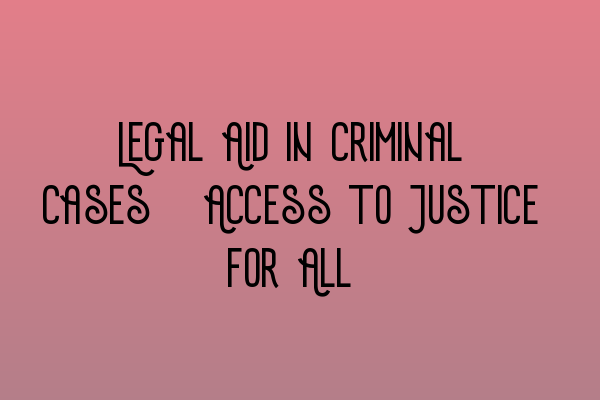Legal Aid in Criminal Cases: Access to Justice for All
As solicitors, our primary goal is to ensure that everyone has access to justice. One of the ways we uphold this principle is through the provision of legal aid in criminal cases. Legal aid allows individuals who cannot afford legal representation to receive the assistance they need, ensuring fair treatment and a fair trial.
What is Legal Aid?
Legal aid is a government-funded program that provides financial assistance to individuals who are unable to afford legal representation. It is designed to ensure that everyone, regardless of their financial circumstances, has the opportunity to access justice. In criminal cases, legal aid covers the cost of hiring a solicitor, barrister, or other legal professionals.
Legal aid is means-tested, meaning that eligibility is based on an individual’s income and assets. The government assesses whether an individual qualifies for legal aid by considering their financial situation and the merits of their case.
The Importance of Legal Aid in Criminal Cases
Legal aid plays a crucial role in ensuring a fair and just legal system. Without access to legal representation, individuals may struggle to understand complex legal procedures and mount a strong defense. This can lead to miscarriages of justice and an unequal balance of power between the prosecution and the accused.
By providing legal aid, we level the playing field and make sure that everyone has an equal opportunity to present their case and defend their rights. This is especially important in criminal cases, where the consequences can be severe, including loss of liberty, damage to reputation, and significant financial repercussions.
The Challenges with Legal Aid
While legal aid is crucial for access to justice, there are challenges associated with its implementation. One of the main challenges is funding. Due to budget constraints, governments often face difficulty in allocating sufficient funds to meet the increasing demand for legal aid services.
This lack of funding can result in limited resources for legal aid providers, making it harder for them to handle a high caseload effectively. Additionally, some individuals may not meet the strict eligibility criteria, leaving them without legal aid despite their financial limitations.
Conclusion
Legal aid in criminal cases is vital for ensuring access to justice for all individuals, regardless of their financial circumstances. It helps to uphold the principles of a fair and just legal system, leveling the playing field and providing equal opportunities for all parties involved.
While there are challenges associated with legal aid, it remains an essential aspect of our legal system. As solicitors, we are committed to advocating for the preservation and improvement of legal aid, ensuring that it continues to serve those who need it most.
Related Articles:
- Legal Representation for Delaware LLCs in the UK: Expert Advice
- Ensuring Ethical Business Practices: Delaware’s Code of Conduct
- Legal Challenges for UK Businesses in the U.S.: Strategies for Overcoming Hurdles
- Legal Challenges for UK Businesses in the U.S.: Strategies for Overcoming Hurdles
- SQE Exam Prep: Essential Study Materials for Aspiring Solicitors
